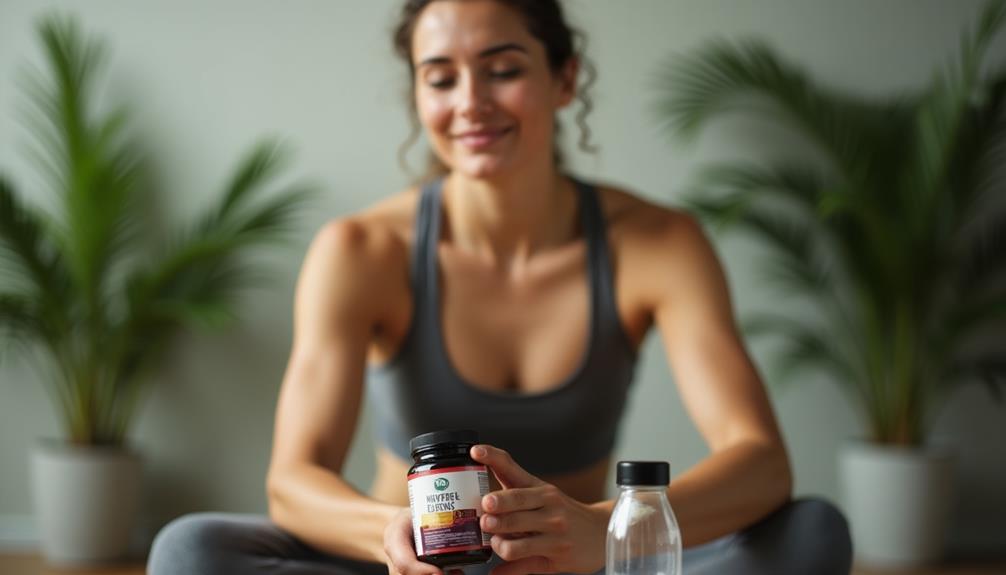To reduce post-workout muscle inflammation, start by staying hydrated; drink plenty of water before, during, and after exercise. Incorporate stretching to enhance blood flow and flexibility. Prioritize nutrition by consuming balanced meals and anti-inflammatory foods shortly after your workout. Use ice therapy for 15-20 minutes post-exercise to reduce swelling. Don't underestimate rest—incorporate rest days and listen to your body. Consider supplements like glutamine for added recovery support. Engage in active recovery, such as light walking or yoga, to promote healing. There's much more you can explore about optimizing your recovery.
Core Insights
- Stay hydrated by drinking water before, during, and after workouts to minimize muscle inflammation and soreness.
- Incorporate stretching and foam rolling post-exercise to improve blood flow and flexibility, aiding recovery.
- Prioritize balanced nutrition with protein, healthy fats, and anti-inflammatory foods within 30-60 minutes after working out.
- Use ice therapy immediately after workouts to reduce swelling and numb pain for quicker recovery.
- Ensure adequate rest days in your routine to allow muscles to recover and reduce the risk of injuries.
Stay Hydrated

Staying hydrated is crucial for minimizing post-workout muscle inflammation. When you exercise, your body loses fluids through sweat, which can lead to dehydration. This dehydration can increase muscle soreness and prolong recovery time. To combat this, aim to drink water before, during, and after your workout. A good rule of thumb is to consume about 16-20 ounces of water in the hours leading up to your exercise session and another 8-10 ounces during your workout. Consider using electrolyte replenishment drinks that contain essential minerals like sodium, potassium, and magnesium to support proper hydration and muscle function during intense workouts.
After you finish, replenish your fluids by drinking at least another 16-24 ounces. If you've had an intense workout, consider electrolyte-rich drinks to restore lost minerals. By maintaining peak hydration, you'll support your muscles and help reduce inflammation effectively.
Incorporate Stretching

Incorporating stretching into your post-workout routine can greatly reduce muscle inflammation and promote recovery. Stretching helps increase blood flow to your muscles, aiding in the removal of lactic acid and other waste products. It also enhances flexibility, which can prevent injuries and improve your overall performance. Consider using a foam roller for myofascial release to complement your stretching routine, as it can help target deeper muscle tissues and provide additional benefits for muscle recovery.
After your workout, take 5 to 10 minutes to focus on static stretches. Target major muscle groups such as your hamstrings, quadriceps, and shoulders. Hold each stretch for about 15 to 30 seconds, breathing deeply as you go.
Remember to listen to your body; don't push yourself into pain. By making stretching a consistent part of your routine, you'll support muscle recovery and feel better in the days that follow.
Prioritize Nutrition

Nutrition plays an important role in minimizing post-workout muscle inflammation. To start, focus on consuming a balanced meal that includes protein, healthy fats, and carbohydrates. Protein helps repair muscle tissue, while carbs replenish your energy stores. Glutamine supplements can also aid in muscle recovery and reduce inflammation. Consider incorporating these supplements into your post-workout routine for added benefits. Aim to eat within 30 to 60 minutes after exercising for best recovery.
Incorporating anti-inflammatory foods can also be beneficial. Think about adding fruits like berries and vegetables such as spinach or kale. These foods are packed with antioxidants that can help reduce swelling.
Don't forget to stay hydrated! Drinking enough water is crucial for overall recovery and can aid in reducing inflammation. By prioritizing your nutrition, you'll support your body's healing process and improve your performance in future workouts.
Use Ice Therapy

After you've fueled your body with the right nutrients, consider using ice therapy to further combat post-workout muscle inflammation. Ice therapy can considerably reduce swelling and numb sharp pain. Start by applying ice packs to the affected areas for about 15-20 minutes. Wrap the ice pack in a cloth to protect your skin from frostbite.
You can also use a cold bath or ice massage if you prefer. Just be mindful to limit your exposure to avoid discomfort.
Incorporating ice therapy right after your workout can help speed up recovery and keep your muscles feeling fresh. Remember, the sooner you apply ice, the better the results, so make it a part of your post-workout routine.
Get Adequate Rest

Additionally, consider incorporating rest days into your routine. These days don't mean complete inactivity; light activities like walking or yoga can help keep your blood flowing without overexerting your muscles. Listen to your body—if you feel sore or fatigued, don't hesitate to take an extra day to recover. Ultimately, prioritizing rest will enhance your overall performance and help prevent injuries in the long run.
Consider Supplements

To support your recovery and reduce muscle inflammation, consider adding supplements to your regimen. Certain supplements can help alleviate soreness and enhance your overall recovery process. Look for those that contain anti-inflammatory properties, like omega-3 fatty acids, curcumin, or ginger.
Here's a quick guide to some effective supplements:
| Supplement | Benefits | Dosage Recommendation |
|---|---|---|
| Omega-3 Fatty Acids | Reduces inflammation and soreness | 1,000-3,000 mg daily |
| Curcumin | Anti-inflammatory and antioxidant | 500-2,000 mg daily |
| Ginger | Eases muscle pain | 1,000-2,000 mg daily |
Before starting any supplement, consult a healthcare professional to verify it fits your needs. By incorporating the right supplements, you can optimize your recovery and feel better faster.
Engage in Active Recovery

Incorporating active recovery into your routine can further enhance your post-workout recovery and reduce muscle inflammation. Active recovery involves low-intensity exercises that promote blood flow and help your muscles recover without straining them. Here are some effective active recovery activities you might consider:
- Walking or light jogging: Keeps your muscles engaged while promoting circulation.
- Yoga or stretching: Improves flexibility and alleviates tightness.
- Cycling at a leisurely pace: Offers a gentle workout that supports recovery.
- Swimming: Provides a full-body workout without impact, easing muscle soreness.
Frequently Asked Questions
How Long Does Muscle Inflammation Usually Last After a Workout?
Muscle inflammation after a workout usually lasts anywhere from a few days to a week, depending on the intensity of your exercise and your body's recovery ability. Listen to your body and give it time to heal.
Can Muscle Inflammation Lead to Injury if Not Managed?
Yes, muscle inflammation can lead to injury if you don't manage it properly. Ignoring the signs may result in chronic pain or strain, so it's vital to address inflammation and allow your body to recover.
Is Muscle Inflammation the Same as Muscle Soreness?
Muscle inflammation isn't the same as muscle soreness; think of inflammation like a fire, while soreness is more like the smoke. Inflammation indicates potential damage, while soreness often signals normal recovery after exercise.
How Can I Tell if My Inflammation Is Severe?
You can tell if your inflammation is severe by monitoring persistent pain, swelling, or reduced mobility. If these symptoms last longer than a few days or worsen, it's best to consult a healthcare professional.
Are There Any Specific Foods That Worsen Inflammation?
If you've ever felt achy after a pizza party, it's not just a feeling. Foods like processed sugars and refined carbs can trigger inflammation. Avoiding them helps keep your body feeling its best post-exercise.

